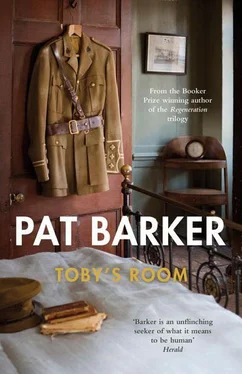With an effort, he dragged himself back to the present. He’d feel more bones than curves if he danced with her now.
‘I was so sorry to hear about Toby.’
He’d already offered his condolences twice, once by letter and once, in person, at the hospital, but he felt it needed to be said again. She nodded; her eyes were bright though he suspected she was past crying. He wondered if she’d ever really cried at all.
‘You know, at first I thought “Missing, Believed Killed” meant there was a tiny bit of hope, but Father says they don’t say that unless they’re sure. It just means there’s nothing left, nothing identifiable.’
She was looking at him, perhaps even now cherishing a small, flickering hope that he might say something different.
‘Your father’s right, I’m afraid.’
‘But surely they’d find the identity disc?’
‘Not necessarily, not if it was a direct hit.’ He groped for something to soften the brutal reality. ‘It would be very quick, no pain, he wouldn’t even have known.’
God, the platitude count was mounting. He hated visiting bereaved relatives; you always ended up saying something utterly banal. Or, worse still, telling lies.
‘Did you know Kit was one of Toby’s stretcher-bearers?’
‘No, I didn’t,’ he said. ‘Actually, I haven’t heard from Kit for quite a while.’
‘Nor me.’ She took a deep, unsteady breath. ‘After Toby — after we got the telegram — I wrote to Kit to ask him if he knew anything, but I didn’t get a reply. I thought it was a bit odd, really. I mean, you’d expect a letter of condolence, wouldn’t you? I mean, he knew Toby, they served together. Only for two or three months, but … Well, I suppose that’s not very long.’
‘Out there it is.’
‘But no, nothing. Not a word. I thought, he can’t have got the letter, so I wrote again.’ She shrugged. ‘Still nothing.’
‘Perhaps he just didn’t know what to say.’
A weak explanation, and not one he accepted for a moment. It was extraordinary that Neville hadn’t written. Why hadn’t he? Because he knew how Toby had died and for some reason couldn’t bring himself to trot out the usual consoling platitudes? But that didn’t excuse ignoring her letters. In fact, Paul couldn’t think of a single acceptable excuse.
‘You must have heard from Toby’s CO?’
‘A couple of sentences. Quite … I don’t know. Grudging.’
‘You could always try the Padre.’
‘Oh, he wrote too, same sort of thing. “Very gallant officer” — so on and so forth. I could’ve told them that.’
‘They mightn’t know anything.’
‘No, I suppose not.’ She wiped her hand across her eyes. ‘Do you think it’s too early for a glass of wine?’
‘I think it’s a marvellous idea.’
She fetched a bottle from the dresser. ‘Here, you open it. I get into a muddle with that corkscrew.’
He drew the cork, poured wine into two glasses and handed one to her. ‘Well,’ he said, at a loss for words. ‘Absent friends.’
They moved closer to the fire. He was glad not to have the expanse of the table between them, though she chose an armchair and left him to occupy the sofa alone. For a moment the only sound was the crackle and hiss of flames.
‘You know, you said once if Toby died you’d come back here and paint the countryside he grew up in. You said you’d want to paint what made him, not what destroyed him.’
She smiled. ‘That’s exactly what I’ve done.’
‘Does it help?’
‘No, nothing helps.’
He waited, but she was not to be trapped into a line of conversation that might end in tears.
‘Come on, I’ll show you.’
They walked across the yard where a few white hens pecked in a desultory way at the dust. A cockerel stalked towards them, shaking his blood-red comb, the last rays of the setting sun waking an emerald gleam in his black neck feathers.
‘I work in the barn now. I find it helps to leave the house in the morning, you know? To actually go to work .’
‘I’m just the same, I thought at first I’d hate getting up in the mornings and going to the Slade, but actually I prefer it.’
The barn was dark at first, so dark he almost stumbled, but there was a door immediately ahead. Once that was open, he saw that the interior was flooded with light: oblique, amber light at this hour of the afternoon, but the windows faced north. The morning light must be wonderful.
Facing the door was an easel, partially draped in a paint-daubed white cloth. Instinctively, he looked away; work in progress was always private. The completed canvases were stacked against a wall.
She waved him over to them. ‘Go on, have a look.’
He took his time. To be brutally honest, he’d expected nostalgia: scenes from rural life, happy children, impossibly long, golden summer days. Instead, he found himself looking at a series of winter landscapes, empty of people. Well, that was his first impression. When he looked more closely, he realized that every painting contained the shadowy figure of a man, always on the edge of the composition, facing away from the centre, as if he might be about to step outside the frame. Many of these figures were so lightly delineated they might have been no more than an accidental confluence of light and shade. He stood back, trying to pin down his response. At one level these were firmly traditional landscape paintings, but there was something unsettling about them. Uncanny. Oddly enough, he recognized the feeling. It was the paradox of the front line: an apparently empty landscape that is actually full of men. How on earth had she managed to get that?
‘They’re very good,’ he said, at last.
‘It’s not about that.’
‘No.’
He held up a canvas, one of the few she’d had framed. It showed the hill behind the house; under the trees, at the edge of the painting, was a patch of deeper shadow that might, or might not, be the head and shoulders of a man. Paul intended to say how much he admired it. Instead, he said, ‘He looks as if he’s trying to get out.’
Her eyes flared. ‘It’s interesting you should say that. I had a lot of trouble with that one. I thought I’d got it and … and then when I came down the next morning the figure had moved.’ She caught his expression. ‘Of course, I don’t mean actually moved. I must have remembered it wrong.’
‘He’s in every painting. Toby.’
‘A male figure.’ She couldn’t meet his eyes. ‘Oh, all right, Toby. But I’m not running away from it, you know. It’s not like you and your corpseless war.’
‘Don’t let’s argue. They are very, very good.’ Clearly, Toby had become her muse. Her talent flourished on his death, like Isabella’s pot of basil growing out of a murdered man’s brains. Elinor wasn’t flourishing, though. When he turned to look at her, he noticed again the shadows under her eyes. ‘You must be pleased.’
‘Ye-es. Only I don’t seem to know where I’m going any more.’ She pointed to the easel. ‘I’ve been trying to finish that for … Oh, I don’t know, feels like for ever.’
‘Perhaps you need a break. Why don’t you come to London?’
‘Yes, I will, I do need a break, but it can’t be next weekend, I’ve got to go to my sister’s. It would’ve been Toby’s twenty-eighth on Saturday. I can’t not be there for that.’
He took a last look round. The sunlight was almost gone and there was a distinct chill in the air.
‘Come on,’ she said, touching his arm. ‘Let’s go and eat.’
Dinner was rabbit stew with herbs and vegetables from the garden: better food than you’d easily find in London these days. At first they ate in silence. Fastidiously, he removed a slug from his cabbage and set it down carefully on the side of his plate.
Читать дальше












